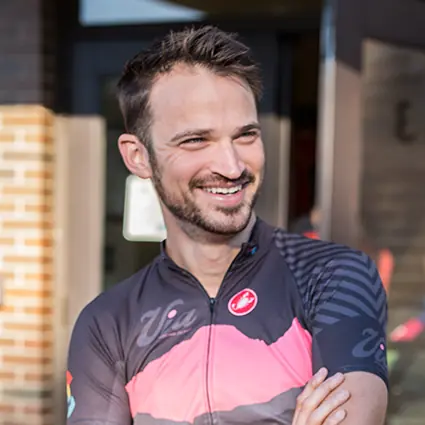HISTORY
SPORTS
Boland Drive: The Street that Still Calls the Game
Joe Boland is one of just two former Notre Dame football players to have a street named after him.
BY AARON HELMAN // POSTED MARCH 3, 2025

Joe Boland poses for a photo during his time as a Notre Dame football player.
The College Football history books are etched with the names of some of Notre Dame's greatest athletes — Montana, Lujack, Brown, Theissman, Gipp, Hart, Hornung, Bettis. Some of the players on that list have seen their names etched into the annals of Heisman Trophy winners. Others have seen their names etched onto Pro Football Hall of Fame plaques.
But none of them have their names emblazoned on any of South Bend's streets.
So far as I can tell, only two local streets are named after former Irish players. The first is the most obvious — Rockne Street.
This article is about the other one:
Boland Drive.
A subscription to the News-Times is always free.
Enter your email address and get new issues straight to your inbox.
Before he was a name on a street sign in South Bend, Joe Boland was a kid from Philadelphia with gridiron ambition. He'd already set himself apart with his play in the City of Brotherly Love, and when he came to Notre Dame in the 1920s, it was because he wanted to be a part of something special, something legendary. Knute Rockne and The Fighting Irish were in the midst of building an empire, and Boland was right in the thick of it, until suddenly, he wasn't.
Football has a cruel way of deciding who stays and who goes. In 1926, a brutal leg injury took Boland off the field for good. For most players, that would have been the end of the story, a tragic fade-out. But Boland wasn't like most players. He wasn't done with football, and football wasn't done with him.
Instead of leaving the game behind, Boland traded his cleats for a clipboard. He became a coach, first at the University of St. Thomas, then back at Notre Dame under Elmer Layden. He worked with offensive linemen, shaping the men who protected the quarterback and paved the way for greatness. But coaching was never going to be his final act. Boland had a voice, a gift for reading the game as it unfolded, for making people feel the action even if they weren't there. And in South Bend, a new stage was waiting for him.

Joe Boland calls a game for WSBT.
It was the 1940s, and radio was king. Families gathered around the family room and listened to voices that painted pictures in their minds. At WSBT, South Bend's first radio station, Boland found a new way to bring football to the people. He wasn't just a commentator; he was a storyteller, giving fans a front-row seat through nothing more than his words. He described plays with such precision and energy that listeners felt like they were sitting in the stands. He had a way of making the crack of the pads, the roar of the crowd, and the sheer electricity of the game come alive.
Boland branched out beyond football, becoming the voice of the South Bend Blue Sox when the team was founded in 1943. That same summer, Boland accompanied eight of the players to Wrigley Field in Chicago during the league's first All-Star Game. Boland was on the mic. He called the first night game in the history of Wrigley Field... and the last one for more than 40 years.
But radio wasn't enough. Not for Boland. He saw the future, and the future was television.
In 1947, Boland spearheaded the creation of the Irish Football Network, a broadcasting empire that stretched beyond Indiana, beyond the Midwest, and beyond the United States itself. Notre Dame was a school with a national following, and wherever those fans went, the games would come with them. Armed Forces Radio carried his broadcasts overseas, letting soldiers thousands of miles away feel, for a moment, like they were home. Notre Dame football was no longer just for those who could make it to South Bend; it was everywhere. And Joe Boland was the voice leading the charge.
He wasn't just a broadcaster; he was an institution. His voice became as much a part of Notre Dame football as the Golden Dome or the echoes that Rockne asked to wake. When Boland called a game, people didn't just hear it — they felt it. He captured every nuance, every momentum shift, every moment of triumph and heartbreak. And for decades, he was the sound of Saturday afternoons in South Bend.
In 1960, Joe Boland's story ended abruptly. A heart attack struck him down at just 55 years old. One moment, he was there, his voice still echoing through the speakers, still shaping the way people experienced the game. The next, he was gone. South Bend mourned. Notre Dame mourned. Football mourned. The voice that had carried the game into living rooms across the country was silenced.
Boland Drive was given its name in 1971, ten years after the death of its namesake. Joe Boland is buried in the Cedar Grove Cemetery.
Aaron Helman is an author, historian and adventurer from South Bend. He grew up near Auten Road. You may have seen him around South Bend drinking coffee. Learn more about his work or check out his books at
aaronhelman.com.
Enjoying what you're reading?
The South Bend News-Times is fully supported by readers like you.
Consider leaving a tip for our writers.



